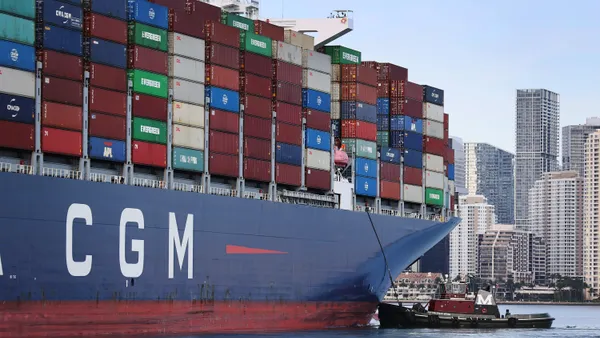Dive Brief:
- Air freight volume fell 3.5% year-over-year (YoY) in October — the twelfth straight month in which it either fell or remained flat, according to the most recent numbers from the International Air Transport Association (IATA).
- The supply of air cargo continues to grow — up more than 2% in October — despite the continued drop in demand. IATA noted that "with demand falling over the past year, even moderate capacity growth has adverse implications for the freight load factor," which is a percentage of the available freight tonnes kilometers used.
- "Demand is set to decline in 2019 overall — the weakest annual outcome since the global financial crisis," IATA CEO Alexandre de Juniac said in a statement. "It has been a very tough year for the air cargo industry."
Dive Insight:
IATA did suggest there are glimmers of a turnaround in some of the economic indicators. For one, international trade volume indicators began to show improvement in September. The association also points to the new export orders measure in the Purchasing Manager Index which is still down year-over-year, but is showing its best numbers since 2018, IATA said.
North American airlines saw their cargo volume drop 2.4% in October while growing capacity by more than 3%.
The drop in volume can be seen in declining cargo revenues at the nation's airlines. Delta and American Airlines saw cargo revenues decline by 17% and 20%, respectively, according to third-quarter earnings calls. And FedEx, the nation's largest cargo airline by revenue, announced almost three months ago it will cut its capacity to address the slump in demand.
UPS did report a 24% growth in next-day air volume in its Q3 earnings, crediting "e-commerce structural changes."
E-commerce is seen as the area most likely to increase demand for air freight. Boeing predicted in its 20-year freight forecast, issued last year, that air cargo would grow 4.2% over the next 20 years and said e-commerce would play an important role in the growth.
But the ongoing trade war has pinched demand for international air cargo — sinking 4% in October. IATA continues to suggest a turnaround might require resolving the tariff battles between the United States and China. It pointed to tariff delays and exclusions as positives signs. "Although this position could change rapidly, for now, this is good news for the world trade and air cargo outlooks," IATA wrote.
Multiple news reports have suggested this week that the Trump administration could delay the China tariff increases scheduled to take place on December 15. Surely, the air cargo industry, and supply chains more broadly, are hopeful for this early holiday gift.














